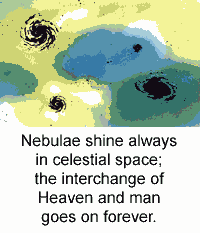Since ancient times believers have held that natural phenomena– wind, rain, thunder and lightning–are creations of divine power. This is the first conception of godhood. Others believe that human acts are judged by divine pleasure or displeasure. Incurring the anger of Heaven brings down disaster; gaining Heaven’s approval brings pardon for grave sins. This is the second conception of godhood.
 Our religion not only holds that deities cannot create nature, but that they too are subject to natural laws on many levels. They simply are more able than human beings to work around these laws.
Our religion not only holds that deities cannot create nature, but that they too are subject to natural laws on many levels. They simply are more able than human beings to work around these laws.
Nature is created by Nature itself, and deities are beings that have evolved more highly than mankind in the natural realm. Deities are intermediaries between matter and Nature. Thus humans can become deities through cultivation. This third conception of godhood is called the Third Theory of Godhood.
Since humans and deities are the same in origin but differ only in degree, they are not fundamentally different. Humans do not match deities in wisdom or cultivation, but this gap is not fundamental. Humans can become deities through cultivation, and deities may descend to being human due to worldly thoughts. Thus we speak of the equality of sacred and mundane.
